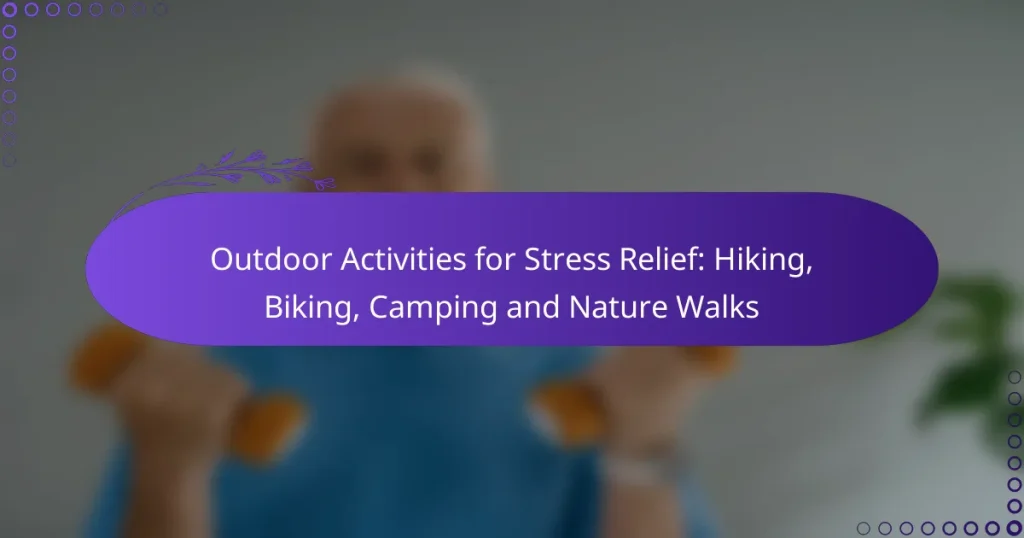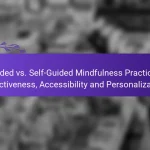Engaging in outdoor activities such as hiking, biking, camping, and nature walks can be a powerful way to relieve stress and enhance mental well-being. These activities provide an opportunity to escape the pressures of daily life, immerse oneself in nature, and foster a sense of relaxation and mindfulness. Whether it’s the tranquility of a forest trail or the exhilaration of a scenic bike ride, connecting with the outdoors offers a refreshing break that can rejuvenate the mind and spirit.
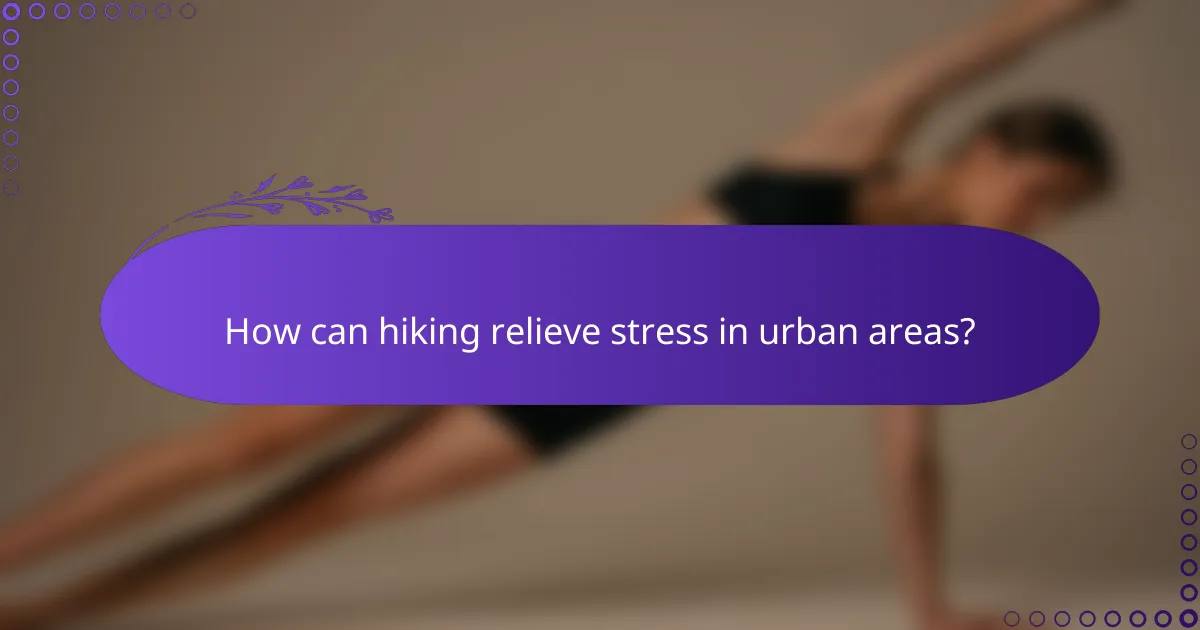
How can hiking relieve stress in urban areas?
Hiking can significantly alleviate stress in urban settings by providing an escape into nature, which contrasts the hustle and bustle of city life. Engaging in this outdoor activity allows individuals to disconnect from daily pressures and reconnect with their surroundings, fostering relaxation and mental well-being.
Access to nature trails
Urban areas often have nearby parks or nature reserves that feature designated hiking trails. These trails provide a convenient way to immerse oneself in nature without needing to travel far. Research local parks or community resources to find accessible paths that suit your hiking preferences.
Many cities also offer guided hikes or organized nature walks, which can enhance the experience by providing insights into local flora and fauna. Participating in these activities can deepen your appreciation for nature and its calming effects.
Physical health benefits
Hiking is a low-impact exercise that promotes cardiovascular health, strengthens muscles, and improves overall fitness. Regular hiking can help maintain a healthy weight and reduce the risk of chronic diseases. Aim for at least 30 minutes of hiking a few times a week to reap these benefits.
Additionally, hiking in varied terrains can enhance balance and coordination. Consider incorporating hills or uneven surfaces into your hikes to challenge your body further and increase the workout’s effectiveness.
Mental clarity and mindfulness
Hiking encourages mindfulness by allowing individuals to focus on their surroundings, breathing, and physical sensations. This practice can lead to improved mental clarity and reduced anxiety. Try to engage your senses by observing the sights, sounds, and smells of nature during your hike.
To maximize the stress-relief benefits, consider hiking without electronic devices. This disconnection can enhance your ability to be present and fully enjoy the experience. Practicing gratitude for the natural environment can also elevate your mood and promote a positive mindset.
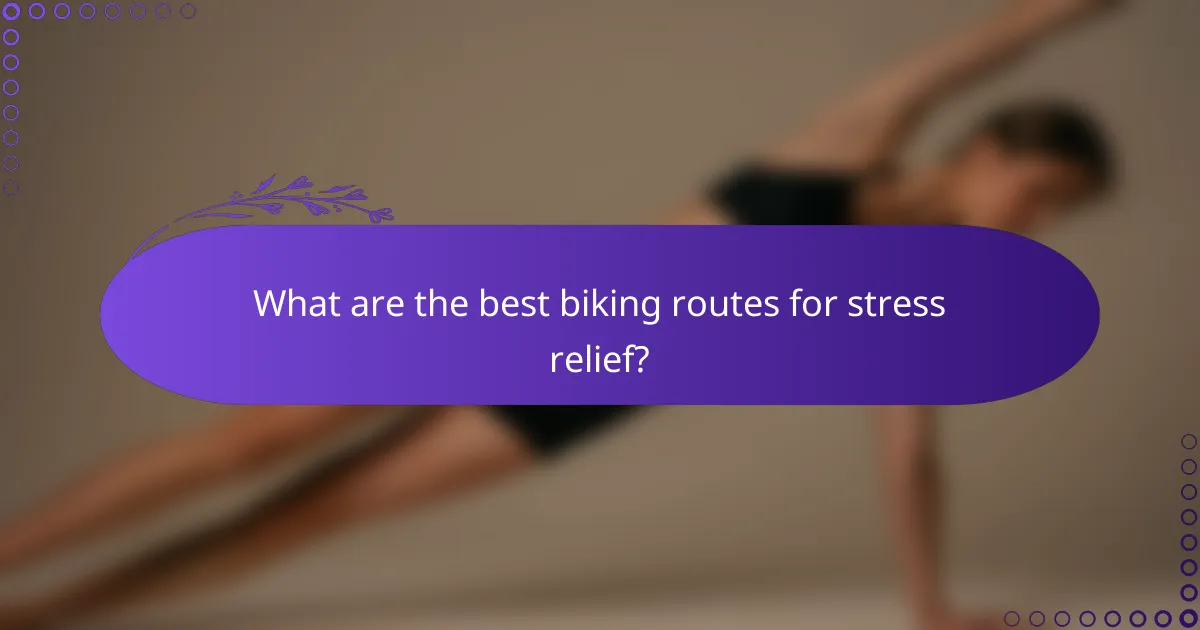
What are the best biking routes for stress relief?
The best biking routes for stress relief are those that offer scenic views, minimal traffic, and a connection to nature. Ideal paths can be found in national parks, local trails, and community events that promote cycling as a healthy activity.
Scenic bike paths in national parks
National parks often feature designated bike paths that allow cyclists to immerse themselves in nature while enjoying the fresh air. Popular options include the C&O Canal Towpath in Maryland and Virginia, which stretches over 180 miles along the Potomac River, and the scenic trails in Yellowstone National Park.
When selecting a route, consider the level of difficulty and the length of the trail. Many national parks offer a range of paths suitable for all skill levels, from easy rides to more challenging terrains.
Community biking events
Community biking events, such as group rides or charity bike-a-thons, provide opportunities for social interaction while promoting physical activity. These events often feature routes that highlight local parks or scenic areas, making them enjoyable for participants.
Joining a local biking club can also enhance your experience, as these groups frequently organize rides that cater to different skill levels and interests. Look for events in your area through community boards or social media platforms.
Benefits of cycling on mental health
Cycling has been shown to significantly improve mental health by reducing stress, anxiety, and depression. The rhythmic nature of pedaling, combined with exposure to outdoor environments, can lead to a meditative state that promotes relaxation.
Regular cycling can also boost endorphin levels, enhancing mood and overall well-being. Aim for at least 30 minutes of cycling a few times a week to experience these mental health benefits effectively.
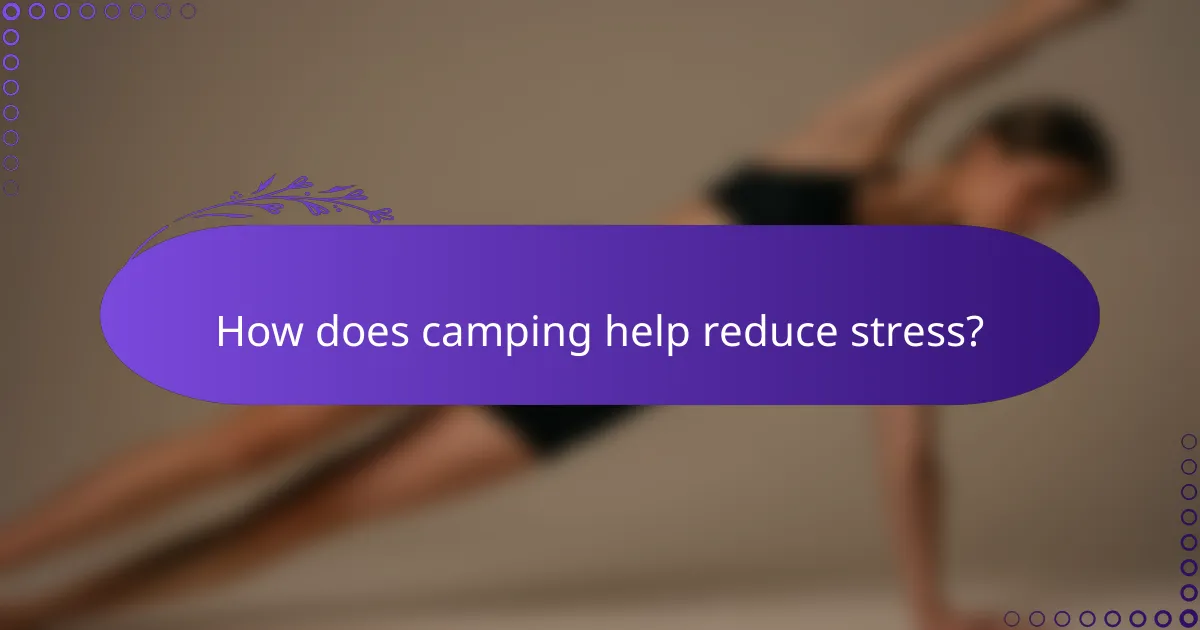
How does camping help reduce stress?
Camping helps reduce stress by immersing individuals in nature, allowing them to disconnect from daily pressures and reconnect with themselves. The experience fosters relaxation, mindfulness, and a sense of adventure, all of which contribute to lower stress levels.
Disconnecting from technology
Camping provides a unique opportunity to unplug from technology and the constant barrage of notifications. By leaving behind smartphones and laptops, individuals can focus on their surroundings and engage in meaningful experiences without distractions. This break from screens can lead to improved mental clarity and a deeper appreciation for nature.
To maximize this benefit, consider setting specific times for checking devices, or leave them behind entirely. Embrace the quiet and allow yourself to be present in the moment, which can significantly enhance your overall well-being.
Building resilience and self-reliance
Camping encourages individuals to face challenges and develop problem-solving skills, fostering resilience and self-reliance. Whether it’s setting up a tent, cooking over a campfire, or navigating a trail, these activities promote confidence and adaptability. Overcoming obstacles in a natural setting can translate to better coping strategies in everyday life.
Start with simple camping tasks and gradually take on more complex challenges. This incremental approach helps build confidence and prepares you for unexpected situations, enhancing your ability to manage stress in various aspects of life.
Social bonding with friends and family
Camping creates a perfect environment for strengthening relationships with friends and family. Shared experiences, such as hiking, cooking, and storytelling around the campfire, foster connection and communication. These interactions can lead to improved emotional support and a sense of belonging, both of which are vital for stress relief.
To enhance social bonding, plan group activities or games that encourage teamwork and collaboration. Engaging in these shared experiences can deepen relationships and create lasting memories, further reducing stress levels.
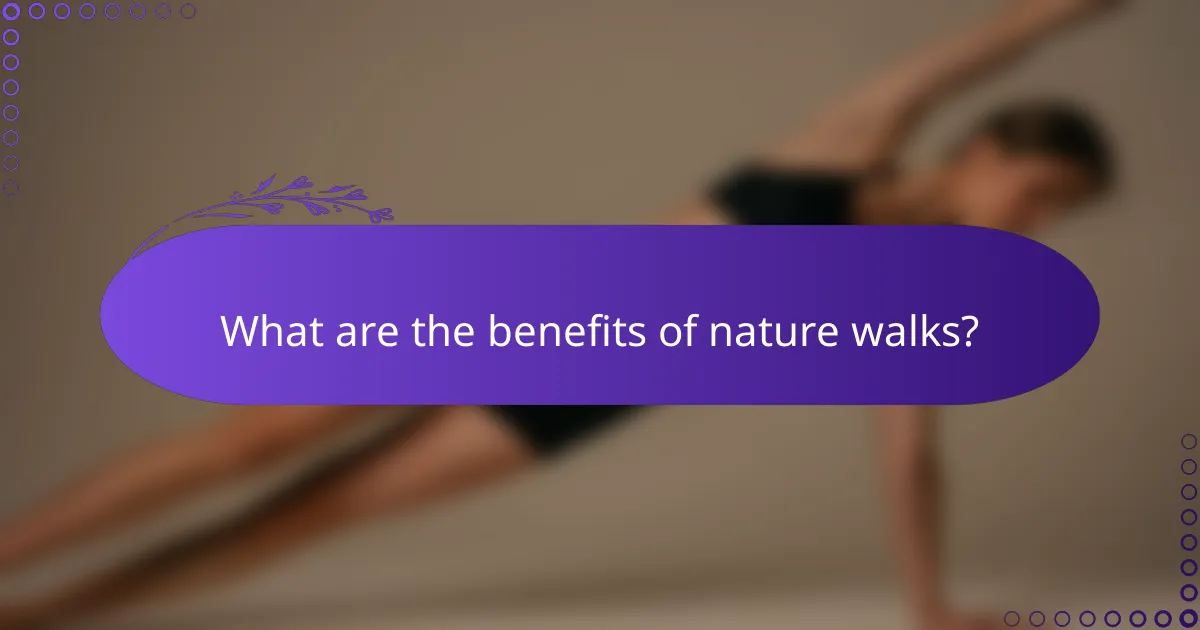
What are the benefits of nature walks?
Nature walks offer numerous benefits, including enhanced mental clarity, reduced stress levels, and improved overall well-being. Engaging with natural surroundings can significantly uplift mood and foster a sense of peace.
Improved mood and emotional well-being
Spending time in nature has been shown to elevate mood and promote emotional health. Exposure to green spaces can lead to decreased anxiety and depression, making it a powerful tool for stress relief.
Research suggests that even short walks in nature can result in noticeable improvements in emotional well-being. Aim for at least 30 minutes of walking in a natural setting to experience these benefits fully.
Connection to local ecosystems
Nature walks help individuals connect with local ecosystems, fostering a sense of belonging and appreciation for the environment. Understanding local flora and fauna enhances the walking experience and encourages environmental stewardship.
Consider participating in community events or educational programs that focus on local ecosystems. These activities can deepen your connection to nature and provide insights into the ecological importance of your area.
Guided nature walks in local parks
Guided nature walks in local parks offer structured opportunities to explore and learn about the environment. These walks are often led by knowledgeable guides who can share insights about the area’s wildlife and plant life.
Check local park websites or community boards for scheduled guided walks. Participating in these events can enrich your experience and provide a supportive environment for those new to nature exploration.
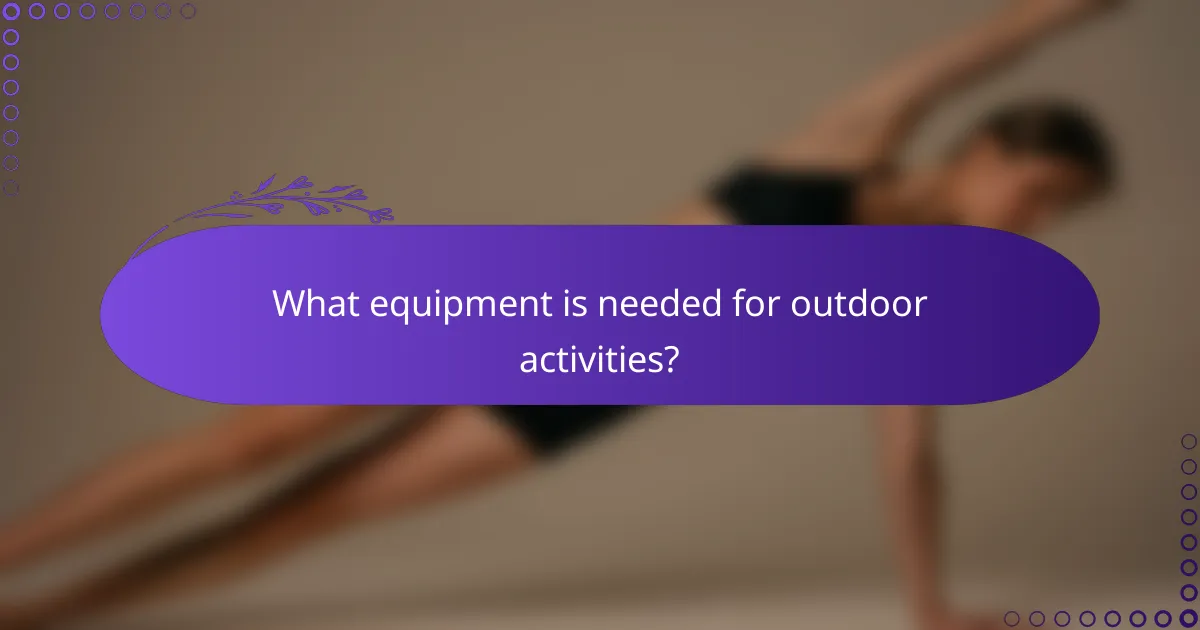
What equipment is needed for outdoor activities?
To fully enjoy outdoor activities like hiking, biking, camping, and nature walks, having the right equipment is essential. This gear enhances safety, comfort, and overall experience while engaging with nature.
Essential hiking gear
When hiking, a sturdy pair of hiking boots is crucial for support and traction on various terrains. A well-fitted backpack, hydration system, and weather-appropriate clothing are also important to ensure comfort during your trek.
Additional items like trekking poles can help with stability, while a map or GPS device is vital for navigation. Always pack a first-aid kit and snacks for energy, especially on longer hikes.
Recommended biking accessories
For biking, a quality helmet is non-negotiable for safety. Padded shorts can enhance comfort on longer rides, while a bike repair kit ensures you’re prepared for minor mechanical issues.
Consider adding lights and reflectors to your bike for visibility, especially if you plan to ride at dusk or dawn. A water bottle holder is also a practical addition to stay hydrated during your ride.
Camping essentials for beginners
Beginners in camping should start with a reliable tent that suits the number of campers and weather conditions. A sleeping bag rated for the expected temperatures and a sleeping pad for comfort are also necessary.
Cooking gear, such as a portable stove, cookware, and utensils, will allow you to prepare meals outdoors. Don’t forget to bring food, water, and a cooler if necessary, along with a flashlight or lantern for nighttime visibility.
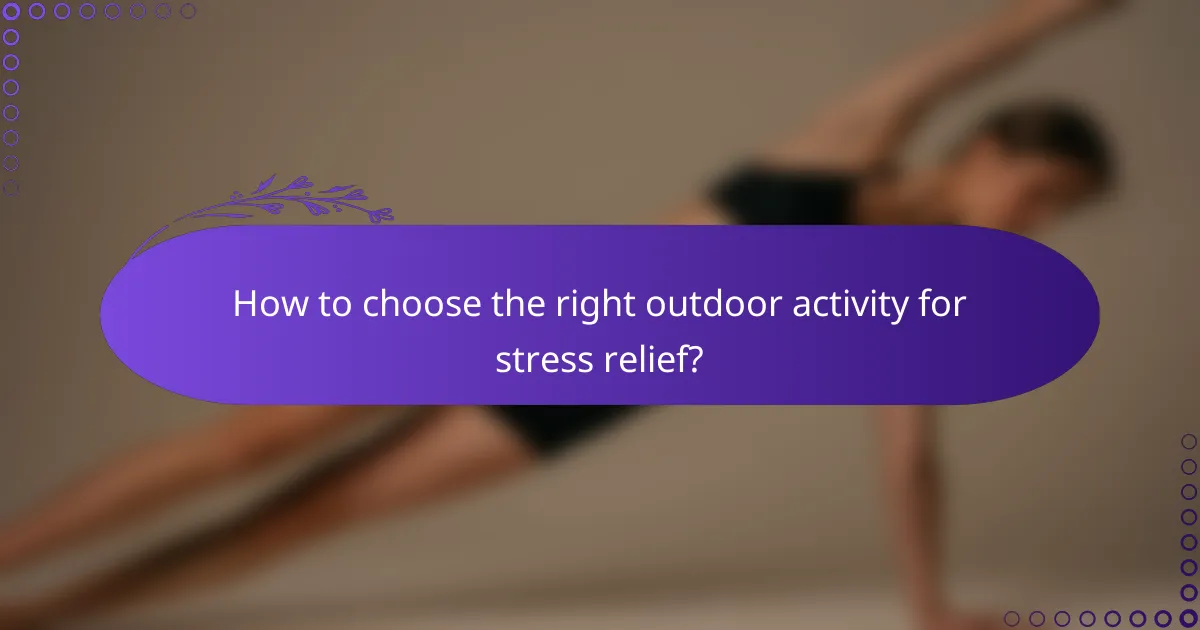
How to choose the right outdoor activity for stress relief?
Selecting the right outdoor activity for stress relief involves understanding your personal preferences, physical fitness levels, and available time. By evaluating these factors, you can find an activity that not only helps alleviate stress but also fits seamlessly into your lifestyle.
Assessing personal preferences
Your personal preferences play a crucial role in choosing an outdoor activity for stress relief. Consider what you enjoy most—whether it’s the solitude of hiking, the thrill of biking, or the tranquility of camping. Engaging in an activity you love increases the likelihood of sticking with it long-term.
Think about the environment you feel most comfortable in. Some people thrive in wooded areas, while others prefer open fields or mountainous terrains. Identifying your ideal setting can enhance your overall experience and effectiveness in reducing stress.
Considering physical fitness levels
Your physical fitness level significantly impacts which outdoor activity is suitable for you. If you are new to exercise or have health concerns, start with low-impact activities like nature walks or leisurely biking. These options allow you to enjoy the outdoors without overexerting yourself.
For those with higher fitness levels, more strenuous activities like hiking on challenging trails or mountain biking can provide a greater physical challenge and stress relief. Always listen to your body and choose activities that match your current fitness capabilities to avoid injury.
Evaluating time availability
Time availability is a key factor when selecting an outdoor activity for stress relief. Assess how much time you can realistically dedicate to an activity. Short nature walks can be done in under an hour, making them ideal for busy schedules, while camping may require a weekend commitment.
Consider planning your outdoor activities around your routine. If you have only a few hours, opt for nearby parks or trails. For longer outings, ensure you allocate enough time for travel and preparation, which can enhance your overall enjoyment and relaxation.
